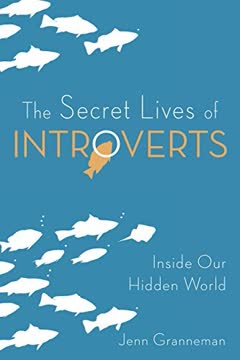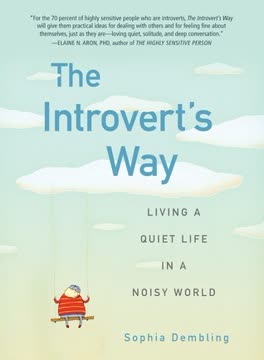Key Takeaways
1. Introversion is a fundamental temperament, not a social deficit.
Being an introvert is a perfectly normal “thing” to be.
Understanding introversion. Introversion is an inborn temperament, a core part of who you are from birth, distinct from personality which is shaped by experience. It influences how you approach and respond to the world, particularly regarding stimulation and social interaction. Feeling different or like an "other" is a common experience for introverts growing up in a world often geared towards extroverted norms.
Early signs appear. Introversion often shows up early in life; introverted children may prefer solitary play, small groups, or quiet observation rather than constant group activity. Recognizing this temperament provides a powerful framework for self-understanding and acceptance, explaining lifelong feelings of being different or needing alone time. It's a label that validates experiences and connects individuals to a wider community of similar people.
It's not a flaw. The core message is that there is nothing inherently wrong with being quiet or needing solitude. These are natural inclinations for a significant portion of the population. Accepting this temperament is crucial for self-confidence and stopping the exhausting pretense of trying to be someone you're not.
2. The science of introversion explains the need for less stimulation.
The reason introverts and extroverts react to things differently—like partying—has to do with a chemical found in the brain called dopamine.
Dopamine differences. Extroverts have a more active dopamine reward system, making them more energized and excited by potential rewards like social attention, status, or new experiences. This reduces their "cost of effort" for pursuing external stimulation. Introverts, however, are not as strongly energized by these external rewards, especially social ones.
Stimulation sensitivity. Introverts are more sensitive to stimulation (sights, sounds, social interaction). Levels of stimulation that are rewarding for extroverts can quickly become tiring or overwhelming for introverts. This leads to feeling drained in crowded, loud, or highly social environments.
Brain processing varies. Research suggests introverts and extroverts process information and rewards differently.
- Extroverts show stronger brain responses (nucleus accumbens, amygdala) to gambling payoffs.
- Extroverts have a greater P300 brain response to human faces than objects, while introverts' responses are similar.
- Introverts may weigh internal cues more strongly than external ones.
These biological differences explain why introverts seek lower levels of stimulation and need quiet time to recharge.
3. Many common beliefs about introverts are simply misconceptions.
Quiet doesn’t equal mad, sad, rude, bitchy, arrogant, or stuck-up.
Debunking myths. Introverts face numerous false stereotypes because their behavior is often misinterpreted through an extroverted lens. Being quiet or reserved is frequently mistaken for negative traits like rudeness, aloofness, or lack of interest. This can lead to hurtful accusations and misunderstandings.
Introversion vs. other traits. It's crucial to distinguish introversion from shyness, social anxiety, or depression.
- Introversion: Preference for low-stimulation environments and solitude for energy.
- Shyness: Fear of negative judgment in social situations.
- Social Anxiety: Intense fear and avoidance of social interactions due to perceived scrutiny.
- Depression: Persistent sadness, loss of interest, and low energy.
While these can overlap, they are not the same.
Challenging stereotypes. Introverts are not antisocial; they socialize differently. They are not necessarily shy; many can be confident and assertive when needed. They are not unemotional or lacking passion; their feelings are often expressed internally or through creative outlets. Introverts can be effective leaders, thinkers, and contributors in all fields, often bringing unique strengths like deep thinking and careful observation.
4. Socializing can lead to a real and draining "introvert hangover."
The introvert hangover is real.
Social burnout. An "introvert hangover" is the physical and mental exhaustion experienced after too much social interaction or stimulation. Unlike extroverts who gain energy from socializing, introverts expend energy and need time alone to recover. This is a genuine phenomenon, not just being tired or antisocial.
Symptoms vary. The hangover can manifest in different ways, including:
- Physical symptoms: Headache, nausea, fatigue, feeling physically unwell.
- Mental symptoms: Brain fog, difficulty concentrating, irritability, anxiety, feeling overwhelmed.
- Behavioral symptoms: Withdrawal, desire to be alone, snapping at others, inability to make decisions.
Recovery requires solitude. The only effective cure is restorative alone time. This means time spent in a low-stimulation environment, engaging in quiet, enjoyable activities that allow the mind to decompress and recharge. The duration of recovery varies depending on the individual and the intensity of the social event.
Misunderstanding exacerbates. When others don't understand the introvert hangover, they may pressure the introvert to stay or question their well-being, which can increase self-consciousness and worsen the exhaustion. Communicating the need for downtime is essential for managing this burnout.
5. Introverts socialize differently, valuing depth over breadth in connections.
Introverts don’t hate socializing; it’s that we do it differently than extroverts.
Quality over quantity. Introverts generally prefer a small circle of close friends and meaningful, one-on-one interactions over large groups and superficial small talk. They seek deep connections and authentic conversations that explore ideas, feelings, and insights.
Small talk aversion. Mindless chitchat is often draining and feels inauthentic to introverts. They would rather discuss something substantive or simply enjoy comfortable silence. Avoiding small talk is not rude; it's a preference for more meaningful engagement.
Building connections. Introverts can improve their social interactions by:
- Seeking one-on-one time.
- Asking open-ended or "why" questions to encourage deeper conversation.
- Being genuinely curious about others.
- Daring to be honest and share authentic thoughts/feelings (in small doses).
- Using their listening skills effectively.
While introverts need solitude, they also need social connection for well-being. Finding the right balance and socializing on their own terms is key.
6. Solitude is essential for introverts' energy, well-being, and creativity.
Solitude is the introvert’s fuel for life.
Recharging mechanism. Alone time is not just a preference; it's a biological necessity for introverts to restore their energy levels after social interaction. It allows them to regulate stimulation and prevent burnout. Without sufficient solitude, introverts become drained, irritable, and less effective.
Benefits of being alone. Solitude offers numerous advantages:
- Problem-solving: Allows the unconscious mind to process and unravel complex issues.
- Improved relationships: Absence can make the heart grow fonder, and being recharged allows for better presence.
- Enhanced focus: Reduces distractions and allows for deeper concentration.
- Self-discovery: Provides space for introspection and clarifying identity and purpose.
- Creativity: Essential for mind-wandering, incubation, and excavating inner ideas.
Making time for solitude. In a busy, extrovert-leaning world, introverts often struggle to get enough alone time due to obligations, guilt, or lack of private space. It's important to prioritize solitude, schedule it if necessary, and communicate its importance to loved ones, framing it as self-care rather than rejection.
Solitude vs. loneliness. While solitude is restorative, introverts can still experience loneliness if their need for meaningful connection is not met. Healthy solitude is a choice for recharging, distinct from reclusion driven by fear or social anxiety.
7. Dating and relationships present unique challenges and strengths for introverts.
Whether introvert or extrovert, the right person for me is someone I feel good being around.
Dating challenges. Introverts may find dating difficult due to:
- Less frequent socializing where potential partners are met.
- Discomfort with small talk and superficial interactions.
- Fear of rejection and self-consciousness.
- Navigating gender stereotypes (e.g., men expected to initiate, women expected to be overtly flirty).
- Potential for idealizing partners or getting attached too quickly.
What introverts seek. Introverts often prioritize qualities like:
- Ability to hold meaningful conversations.
- Good listening skills.
- Respect for alone time needs.
- Intelligence and a "meeting of the minds."
- Authenticity and emotional stability.
Introvert-Introvert vs. Introvert-Extrovert. Both pairings can be successful.
- Introvert-Introvert: Advantages include mutual understanding of solitude needs and matching energy levels. Challenges include potential isolation and needing to work harder to initiate social activities or spend intentional time together.
- Introvert-Extrovert: Advantages include the extrovert bringing the introvert out and providing a social circle. Challenges include negotiating alone time, potential for the extrovert to misinterpret the introvert's quietness, and the introvert needing to speak up more.
Ultimately, compatibility and mutual respect for each other's needs are more important than matching temperaments.
8. Introverts bring unique and valuable strengths to the workplace.
Introverts can make seriously awesome employees and leaders...
Workplace assets. Introverts possess qualities highly beneficial in professional settings, though they may not always be the most visible. These strengths include:
- Deep focus and concentration, leading to thorough work.
- Persistence in problem-solving.
- Strong listening skills and careful observation.
- Ability to work independently and generate unique ideas (often better than brainstorming groups).
- Calm demeanor in chaotic situations.
- Tendency to become experts in their field due to a love of learning.
Team dynamics. While extroverts may make strong first impressions, research suggests introverts, particularly those who are conscientious, can be better long-term team players. They may be more concerned with group perception and work harder to contribute effectively.
Undervalued contributions. Introverts' contributions may be overlooked because they don't always promote themselves or speak up loudly in meetings. Their preference for quiet work and aversion to office politics can mean their value isn't immediately apparent to those who equate visibility with competence.
Recognizing and leveraging these inherent strengths is key for introverts to thrive professionally and for companies to build effective teams.
9. Navigating career challenges involves leveraging your introverted nature.
Perhaps one of the biggest struggles for introverts is the job interview.
Interview hurdles. Job interviews are often challenging for introverts due to the high-pressure, high-stimulation environment that requires quick thinking, self-promotion, and small talk – skills that don't always showcase an introvert's best qualities. Panel interviews can be particularly overwhelming.
Self-promotion strategies. Introverts can improve their visibility and interviewing skills by:
- Practicing self-promotion, framing it as stating facts rather than bragging.
- Highlighting introvert strengths like deep thinking, careful decision-making, and conscientious work.
- Being honest about preferred work environments (e.g., needing quiet time).
- Using specific examples and quoting others to back up accomplishments.
Networking effectively. Networking doesn't have to mean large, overwhelming events. Introverts can network by:
- Focusing on one-on-one interactions.
- Using listening skills to build rapport.
- Asking thoughtful, open-ended questions.
- Hosting smaller, more controlled gatherings.
- Leveraging existing connections (friends, acquaintances).
Getting noticed at work. Introverts can increase their visibility without becoming extroverts by:
- Building strong one-on-one relationships with key people (supervisors).
- Taking initiative on tasks, even small ones.
- Making brief, visible appearances (greeting coworkers, replacing emails with short in-person chats).
- Becoming a go-to expert in a specific area.
By adapting strategies to fit their temperament, introverts can successfully navigate career challenges and advance professionally.
10. The introvert's rich inner world is a source of creativity and complexity.
What is it like in your inner world?
A vibrant landscape. The introvert's inner world is often described as rich, vivid, and constantly active. It's a space for imagination, reflection, analysis, and processing thoughts and emotions. This internal focus can be a source of comfort, adventure, and deep understanding.
Fueling creativity. Spending significant time in the inner world contributes to creativity by:
- Providing space for mind-wandering and "creative incubation."
- Allowing for deep concentration without external distractions.
- Facilitating introspection and self-exploration.
- Enabling detailed observation of the world, which feeds ideas.
- Offering a private space for authentic emotional expression.
The shadow side: Overthinking. While the inner world is powerful, it can also lead to unproductive overthinking, characterized by rumination (rehashing the past) and worrying (catastrophizing the future). This can be mentally draining, fuel anxiety and depression, and lead to inaction or paralysis.
Managing overthinking. Breaking the cycle requires conscious effort:
- Recognizing when you are overthinking.
- Putting thoughts into perspective (challenging negative exaggerations).
- Finding ways to externalize thoughts (writing, talking to a trusted friend).
- Practicing mindfulness to stay present.
- Setting time limits for rumination.
The introvert's inner world is a powerful engine, capable of generating brilliant ideas but also requiring mindful management to prevent it from becoming a source of distress.
11. Embracing your introversion is the first step to a fulfilling life.
It all starts when you begin working with your introversion, rather than fighting against it.
Acceptance is key. For many introverts, years of feeling different or being misunderstood lead to trying to suppress their natural temperament and act like an extrovert. This is exhausting and prevents living authentically. Accepting and embracing introversion is fundamental to well-being.
Working with your nature. Instead of fighting against your need for solitude or preference for depth, build a life that honors these aspects. This means:
- Prioritizing alone time for recharging.
- Choosing social interactions and relationships that are meaningful.
- Seeking careers and work environments that leverage introvert strengths.
- Communicating your needs clearly to others.
Living authentically. When your outer life aligns with your inner world, you feel more whole and content. This doesn't mean becoming a recluse, but rather finding balance and engaging with the world in a way that feels true to yourself. It's about being celebrated for who you are, not just tolerated.
Ultimately, understanding and accepting your introverted nature empowers you to make choices that lead to greater happiness, energy, and fulfillment in all areas of life.
Last updated:
FAQ
What’s The Secret Lives of Introverts by Jenn Granneman about?
- Deep dive into introversion: The book explores the inner world of introverts, explaining their unique experiences, needs, and challenges in a society that often favors extroversion.
- Blend of science and stories: Jenn Granneman combines the latest research on introversion with personal anecdotes and interviews, making the content both evidence-based and relatable.
- Practical life guidance: It offers actionable advice for introverts on socializing, relationships, careers, and self-care, helping them embrace and thrive with their temperament.
Why should I read The Secret Lives of Introverts by Jenn Granneman?
- Validation and self-acceptance: The book reassures introverts that their temperament is natural and valuable, not a flaw, and helps them feel understood.
- Actionable strategies: Readers gain practical tools for managing social situations, relationships, and work, tailored specifically for introverts’ needs.
- Bridging personality gaps: It provides tips for both introverts and extroverts to better understand each other, improving communication and relationships.
What are the key takeaways from The Secret Lives of Introverts by Jenn Granneman?
- Introversion is a strength: Introverts possess unique qualities like deep thinking, creativity, and empathy, which can be leveraged for success and fulfillment.
- Embrace your nature: The book encourages introverts to honor their preferences for solitude and meaningful connection, rather than forcing themselves to fit extroverted norms.
- Practical advice for life: From dating to careers, the book offers strategies for introverts to navigate the world authentically and confidently.
What are the main signs of introversion according to Jenn Granneman’s The Secret Lives of Introverts?
- Enjoyment of solitude: Introverts feel energized by alone time and often prefer solitary activities like reading or creative hobbies.
- Deep inner world: They have a rich inner monologue, process thoughts deeply, and often reflect before speaking or acting.
- Limited social energy: Socializing, especially in large or noisy groups, can be draining, leading to a need for downtime to recharge.
How does Jenn Granneman define the “introvert hangover” in The Secret Lives of Introverts?
- Exhaustion after socializing: The introvert hangover is a state of mental and physical fatigue following excessive social interaction.
- Symptoms and causes: It includes irritability, brain fog, and a strong desire for solitude, caused by overstimulation and a less active dopamine reward system.
- Prevention and recovery: The only cure is restorative alone time, and introverts are encouraged to plan breaks and balance social activities with solitude.
What is the science behind introversion as explained in The Secret Lives of Introverts by Jenn Granneman?
- Dopamine sensitivity: Introverts have a less active dopamine reward system, making them less stimulated by external rewards and social excitement.
- Overstimulation risk: They are more sensitive to noise, crowds, and social interaction, leading to quicker energy depletion.
- Temperament vs. personality: Introversion is an inborn temperament shaped by genetics and biology, distinct from personality traits that develop over time.
What are the four types of introverts described in The Secret Lives of Introverts by Jenn Granneman?
- Social introverts: Prefer solitude or small groups, not necessarily shy but avoid large gatherings.
- Thinking introverts: Highly introspective and imaginative, enjoy deep reflection and daydreaming.
- Anxious introverts: Experience social anxiety and self-consciousness, often ruminate even in familiar settings.
- Restrained introverts: Deliberate and slow to act or speak, prefer to think before responding and avoid impulsivity.
How does Jenn Granneman differentiate introversion from shyness in The Secret Lives of Introverts?
- Preference vs. fear: Introversion is about preferring low-stimulation environments, while shyness involves fear of negative judgment.
- Distinct experiences: An introvert may skip a party to recharge, while a shy person may avoid it due to anxiety.
- Overlap but not the same: Some introverts are shy, but many are not; understanding the difference helps introverts work on social skills without feeling broken.
What misconceptions about introverts does Jenn Granneman address in The Secret Lives of Introverts?
- Not rude or antisocial: Introverts may seem quiet or aloof, but their need for solitude is self-care, not a sign of disliking people.
- Capable of passion and leadership: Introverts can be deeply passionate, successful leaders, and enjoy fun—just on their own terms.
- Introversion ≠ lack of confidence: Many introverts are confident and successful by leveraging their unique strengths.
What advice does Jenn Granneman give for introverts to manage socializing and friendships in The Secret Lives of Introverts?
- Prioritize depth over breadth: Focus on a small circle of close friends and meaningful conversations rather than many acquaintances.
- Set boundaries and communicate: It’s important to say no when needed and explain the need for alone time to others.
- Prepare and engage authentically: Use strategies like preparing for events and seeking one-on-one interactions to build fulfilling relationships without burnout.
How does The Secret Lives of Introverts by Jenn Granneman guide introverts in dating and relationships?
- Value selectivity: Introverts are encouraged to be picky, waiting for partners who truly understand and energize them.
- Leverage introvert strengths: Use deep reflection and self-awareness to discern what’s truly wanted in a partner.
- Balance attachment and caution: Avoid getting too attached too quickly, and be mindful of idealizing partners; authenticity and patience are key.
What are the best quotes from The Secret Lives of Introverts by Jenn Granneman and what do they mean?
- “What makes us weird also makes us wonderful.” This quote highlights that introverts’ unique traits are sources of strength and value, not flaws.
- “Be as you are.” Jenn’s motto encourages introverts to embrace their true selves, fostering fulfillment and happiness.
- “Follow your heart, listen to your brain, and it will all be okay.” This advice balances emotional intuition with rational patience, especially in relationships.
Review Summary
The Secret Lives of Introverts receives mixed reviews, with many praising its relatable content and practical advice for understanding introversion. Readers appreciate the author's empathetic approach and insights into introvert experiences. Some find it validating and helpful for self-discovery, while others feel it lacks depth or new information. The book is particularly recommended for those new to introversion or extroverts seeking to understand introverted friends and family. Critics note its informal style and potential for overgeneralization, but overall, it is seen as a valuable resource for introverts navigating various life aspects.
Similar Books
Download PDF
Download EPUB
.epub digital book format is ideal for reading ebooks on phones, tablets, and e-readers.









